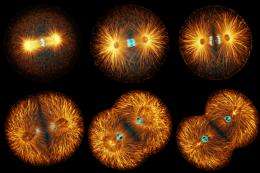Researchers aim to simplify a compound that acts on alpha-tubulin to slow down the process of cell division associated w

Research is being carried out to design and synthesise a new generation of compounds that act on the tubulin molecule, involved in cell multiplication, through a mechanism that has not yet been used in chemotherapy. The researchers will then evaluate its anticarcinogenic potential for later application as a therapeutic treatment. This work is being done by the Organic Synthesis group of the Department of Inorganic and Organic Chemistry at the Universitat Jaume I (UJI) in Castellón, Spain.
Today there are only five known compounds that act on alpha-tubulin to impede the process of uncontrolled division of carcinogenic cells. However, their structures are relatively complex from a chemical perspective and the aim is to achieve compounds with simpler structures in order to make them more profitable and effective.
The three-year project (from 2009 to 2011) is being financed by the Ministry of Science and Innovation and by the UJI Research Plan with the collaboration of Bancaja - Caja Castellón Foundation. Among the approaches used in chemotherapy to attempt to slow down the process of uncontrolled division of cancer cells, those that act on tubulin have been proven to be highly effective. Researcher Juan Murga explains that tubulin has been the focus of many research projects to combat cancer. “Tubulin is made up of two fragments, called alpha-tubulin and beta-tubulin. All the medicines currently available on the market act only on beta-tubulin. There are just five known products that act on alpha-tubulin and only one of these is in clinical trials”, says Murga.
The availability of medicines that act on alpha-tubulin would open up new possibilities for treating tumours that do not respond to medicines directed at beta-tubulin. Furthermore, the creation of simpler compounds would “simplify synthetic production and make it more profitable and efficient, which is important from the perspective of the pharmaceutical industry”, explains Professor Miguel Carda. Moreover, the structural simplification of the compounds enables the elements that generate the desired biological action to be maintained and the rest to be eliminated, so as to achieve a more direct and effective action. “The more specific a medicine is, the better it will act against the cancer cells without damaging the healthy ones”, says Carda.
Of the five known compounds that act on alpha-tubulin, the Organic Synthesis group at the UJI is working on two that have been proven to be among the most effective and it is attempting to determine the pharmacophore groups that are the key to their biological activity. Once the active groups of the molecules have been identified, Murga explains that the researchers will try to “construct the simplest molecule possible with the same or greater activity compared to the reference product. To this end what we will do is synthesise compounds that incorporate different fragments of the reference molecule and evaluate the activity of each of the synthetic compounds on alpha-tubulin” through tests that will be carried out in a laboratory of the CSIC (Spanish National Research Council) in Madrid. The laboratory has a series of protocols for working with tubulin that have established it as one of the leading reference laboratories in this field.
In short, we are trying to “create the most active compound with the simplest possible structure”, says Murga, since “there are molecules available on the market that are very active against cancer but very complex and difficult to obtain, which makes their production enormously expensive”. According to the researchers, a second phase of the project aims to prepare compounds that act simultaneously on alpha- and beta-tubulin. This would be a new type of medicine that would open up a whole field of possibilities in the fight against cancer.
Source: Universitat Jaume I

















